Foreign, Commonwealth and Development Office
The Foreign, Commonwealth & Development Office (FCDO), formerly known as the Foreign & Commonwealth Office (FCO) until September 2020, and commonly called the Foreign Office (FO), is a department of the Government of the United Kingdom. It is responsible for protecting and promoting British interests worldwide and was created in 1968 by the merger of the Foreign Office and the Commonwealth Office.
 | |
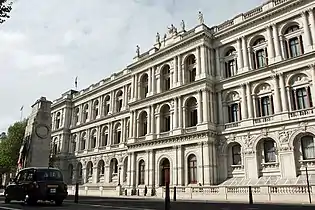 FCDO Main Building, London, seen from Whitehall | |
| Department overview | |
|---|---|
| Formed | 1782 (as the Foreign Office) |
| Preceding agencies | |
| Jurisdiction | United Kingdom |
| Headquarters | King Charles Street London SW1 51°30′11″N 0°07′40″W |
| Annual budget | £1.1bn (current) & £0.1bn (capital) in 2015–16[1] |
| Ministers responsible |
|
| Department executive |
|
| Child agencies | |
| Website | www |
| This article is part of a series on |
| Politics of the United Kingdom |
|---|
.svg.png.webp) |
|
|
The head of the FCDO is the Secretary of State for Foreign, Commonwealth and Development Affairs, commonly abbreviated to "Foreign Secretary". This is regarded as one of the four most prestigious positions in the Cabinet – the Great Offices of State – alongside those of Prime Minister, Chancellor of the Exchequer and Home Secretary.
The FCDO is managed from day to day by a civil servant, the Permanent Under-Secretary of State for Foreign Affairs, who also acts as the Head of Her Majesty's Diplomatic Service. This position is held by Sir Philip Barton, who took office on 2 September 2020.
In September 2020, the Foreign, Commonwealth & Development Office was formed from merging with the Department for International Development[2] and the Foreign Secretary's responsibilities merged with those of the Secretary of State for International Development.
Responsibilities
According to the FCDO website, the department's key responsibilities (as of 2020) are as follows:[3]
- Safeguarding the UK's national security by countering terrorism and weapons proliferation, and working to reduce conflict.
- Building the UK's prosperity by increasing exports and investment, opening markets, ensuring access to resources, and promoting sustainable global growth.
- Supporting British nationals around the world through modern and efficient consular services.
In addition to the above responsibilities, the FCDO is responsible for the British Overseas Territories.[4] This arrangement has been subject to criticism in the UK and in the overseas territories; for instance, the Chief Minister of Anguilla, Victor Banks, said: "We are not foreign; neither are we members of the Commonwealth, so we should have a different interface with the UK that is based on mutual respect".[5] There have been numerous suggestions on ways to improve the relationship between the overseas territories and the UK. Suggestions have included setting up a dedicated department to handle relations with the overseas territories and the absorption of the OTD in the Cabinet Office, thus affording the overseas territories with better connections to the centre of government.[6]
Ministers
The FCDO Ministers are as follows:[7][8]
| Minister | Rank | Portfolio |
|---|---|---|
| The Rt Hon. Dominic Raab MP | Secretary of State for Foreign, Commonwealth & Development Affairs | Strategy Directorate; national security; intelligence; honours; Europe; all major spending decisions, and overall delivery and management of the 0.7% of Gross National Income spending for Official Development Assistance (ODA); working with and supporting international partners on the global response to COVID-19; Deputising for the Prime Minister. |
| The Rt Hon. James Cleverly MP | Minister of State for Middle East and North Africa | Middle East and North Africa conflict, humanitarian issues, human security; CHASE (Conflict, Humanitarian and Security Department); Stabilisation Unit; defence and international security; Organisation for Security and Cooperation in Europe (OCSE) and Council of Europe; Conflict, Stability and Security Fund (CSSF); safeguarding; counter terrorism. |
| The Rt Hon. The Lord Goldsmith of Richmond Park PC | Minister of State for Pacific and the Environment (Jointly with DEFRA) | international climate change, environment and conservation, biodiversity; oceans; Oceania; Blue Belt; COVID-19 issues related to animal welfare; agri-food trade (for negotiations); forestry policy: domestic and international; International Whaling Commission; international oceans; illegal wildlife trade; animal welfare; green recovery; trade including standards, market access and exports, geographical indicators; lead for Forestry Commission; House of Lords Minister for Environment, including Environment Bill. |
| Nigel Adams MP | Minister of State for Asia | East Asia and South East Asia; economic diplomacy; trade (including Trade for Development); Economics Unit; Prosperity Fund; communications; soft power, including British Council, BBC World Service and scholarships; third-country agreements; consular; global Travel Advice; repatriations policy and operations related to COVID-19; parliamentary relations. |
| The Rt Hon. The Lord Ahmad of Wimbledon | Minister of State for South Asia and the Commonwealth | South Asia; Commonwealth; UN and multilateral; governance and democracy; open societies and anti-corruption; human rights, including Preventing Sexual Violence in Conflict Initiative (PSVI); treaty policy and practice; sanctions; departmental operations: human resources and estates; COVID-19 HR issues; multilateral duties to the UN and the Commonwealth related to COVID-19. |
| James Duddridge MP | Parliamentary Under Secretary of State for Africa | Sub-Saharan Africa; economic development; oversight of international financial institutions; CDC (UK government's development finance institution); research and evidence; medical procurement; wider supply chains. |
| Wendy Morton MP | Parliamentary Under Secretary of State for the European Neighbourhood and the Americas | East and South-East Europe (including Gibraltar and Akrotiri & Dhekelia); Central Asia; Americas (including the Falklands); health, global health security, neglected tropical diseases; water and sanitation; nutrition; global health including global work on COVID-19 vaccines; therapeutics and diagnostics, and multilateral health organisations including WHO; the Global Fund, GAVI (the Vaccine Alliance); cruises and contact with the cruise ship industry. |
| Vacant | Parliamentary Under Secretary of State for the Overseas Territories and Sustainable Development | Overseas Territories (except Falklands and Gibraltar) and Polar Regions; Caribbean; children, youth and education (including girls' education); gender equality, and sexual and reproductive health and rights; inclusive societies (LGBT, civil society, disability, ageing, social protection, Leave No One Behind); global partnerships and Sustainable Development Goals; departmental operations: finance and Protocol. |
History
Eighteenth century
The Foreign Office was formed in March 1782 by combining the Southern and Northern Departments of the Secretary of State, each of which covered both foreign and domestic affairs in their parts of the Kingdom. The two departments' foreign affairs responsibilities became the Foreign Office, whilst their domestic affairs responsibilities were assigned to the Home Office. The Home Office is technically the senior.[9]
Nineteenth century
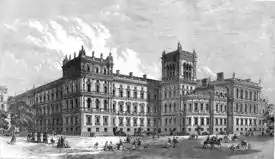
During the 19th century, it was not infrequent for the Foreign Office to approach The Times newspaper and ask for continental intelligence, which was often superior to that conveyed by official sources.[10] Examples of journalists who specialized in foreign affairs and were well connected to politicians included: Henry Southern, Valentine Chirol, Harold Nicolson, and Robert Bruce Lockhart.[11]
Twentieth century
During the First World War, the Arab Bureau was set up within the British Foreign Office as a section of the Cairo Intelligence Department. During the early cold war an important department was the Information Research Department, set up to counter Soviet propaganda and infiltration. The Foreign Office hired its first woman diplomat, Monica Milne, in 1946.[12]
The Foreign and Commonwealth Office (1968–2020)
The FCO was formed on 17 October 1968, from the merger of the short-lived Commonwealth Office and the Foreign Office.[13] The Commonwealth Office had been created only in 1966, by the merger of the Commonwealth Relations Office and the Colonial Office, the Commonwealth Relations Office having been formed by the merger of the Dominions Office and the India Office in 1947—with the Dominions Office having been split from the Colonial Office in 1925.
The Foreign and Commonwealth Office held responsibility for international development issues between 1970 and 1974, and again between 1979 and 1997.
The National Archives website contains a Government timeline to show the departments responsible for Foreign Affairs from 1945.[14]
Under New Labour (1997–2010)
From 1997, international development became the responsibility of the separate Department for International Development.
When David Miliband took over as Foreign Secretary in June 2007, he set in hand a review of the FCO's strategic priorities. One of the key messages of these discussions was the conclusion that the existing framework of ten international strategic priorities, dating from 2003, was no longer appropriate. Although the framework had been useful in helping the FCO plan its work and allocate its resources, there was agreement that it needed a new framework to drive its work forward.
The new strategic framework consists of three core elements:
- A flexible global network of staff and offices, serving the whole of the UK Government.
- Three essential services that support the British economy, British nationals abroad and managed migration for Britain. These services are delivered through UK Trade & Investment (UKTI), consular teams in Britain and overseas, and UK Visas and Immigration.
- Four policy goals:
- countering terrorism and weapons proliferation and their causes
- preventing and resolving conflict
- promoting a low-carbon, high-growth, global economy
- developing effective international institutions, in particular the United Nations and the European Union.
In August 2005, a report by management consultant group Collinson Grant was made public by Andrew Mackinlay. The report severely criticised the FCO's management structure, noting:
- The Foreign Office could be "slow to act".
- Delegation is lacking within the management structure.
- Accountability was poor.
- The FCO could feasibly cut 1200 jobs.
- At least £48 million could be saved annually.
The Foreign Office commissioned the report to highlight areas which would help it achieve its pledge to reduce spending by £87 million over three years. In response to the report being made public, the Foreign Office stated it had already implemented the report's recommendations.[15]
In 2009, Gordon Brown created the position of Chief Scientific Adviser (CSA) to the FCO. The first science adviser was David C. Clary.[16]
On 25 April 2010, the department apologised after The Sunday Telegraph obtained a "foolish" document calling for the upcoming September visit of Pope Benedict XVI to be marked by the launch of "Benedict-branded" condoms, the opening of an abortion clinic and the blessing of a same-sex marriage.[17]
Coalition and Conservatives (2010–2020)
.jpg.webp)
In 2012, the Foreign Office was criticised by Gerald Steinberg, of the Jerusalem-based research institute NGO Monitor, saying that the Foreign Office and the Department for International Development provided more than £500,000 in funding to Palestinian NGOs which he said "promote political attacks on Israel." In response, a spokesman for the Foreign Office said "we are very careful about who and what we fund. The objective of our funding is to support efforts to achieve a two-state solution. Funding a particular project for a limited period of time does not mean that we endorse every single action or public comment made by an NGO or by its employees."[18]
In September 2012, the FCO and the Canadian Department of Foreign Affairs signed a Memorandum of Understanding on diplomatic cooperation, which promotes the co-location of embassies, the joint provision of consular services, and common crisis response. The project has been criticised for further diminishing the UK's influence in Europe.[19]
In 2011, the then Foreign Secretary, William Hague, announced the government's intention to a number of new diplomatic posts in order to enhance the UK's overseas network.[20][21] As such, eight new embassies and six new consulates were opened around the world.[22]
Foreign, Commonwealth and Development Office (2020–present)
On 16 June 2020, Prime Minister Boris Johnson announced the merger of the FCO with the Department for International Development.[23] This was following the decision in the February 2020 cabinet reshuffle to give cross-departmental briefs to all junior ministers in the Department for International Development and the Foreign Office.[24] The merger, which will create the Foreign, Commonwealth and Development Office, is expected to take place in September 2020[25] with a stated aim of ensuring that aid is spent "in line with the UK's priorities overseas."[26] The merger was criticised by three former prime ministers – Gordon Brown, Tony Blair and David Cameron – with Cameron saying that it would mean "less respect for the UK overseas".[27] The Chief Executive of Save the Children, Kevin Watkins, called it "reckless, irresponsible and a dereliction of UK leadership" that "threatens to reverse hard-won gains in child survival, nutrition and poverty".[27]
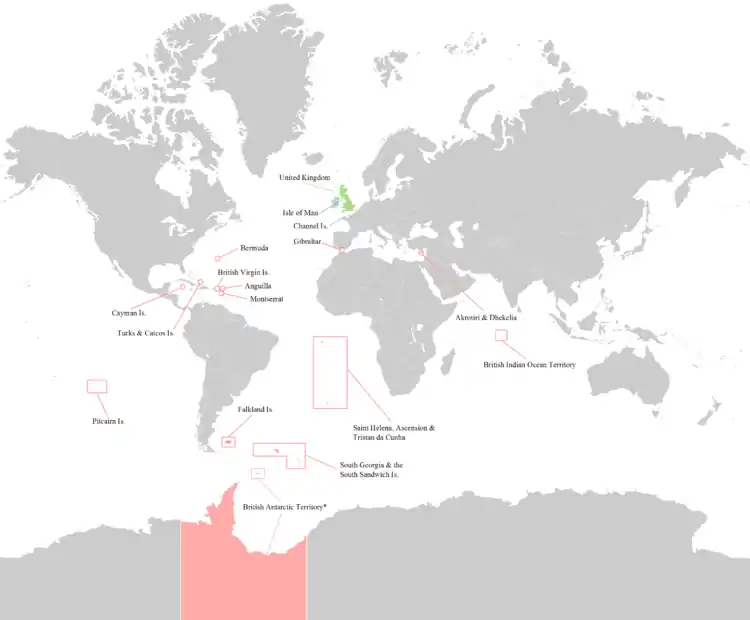
Diplomatic Academy
Following a prior announcement by the then Foreign Secretary William Hague, the FCO opened the Diplomatic Academy in February 2015.[28] The new centre, opened by the Duke of Cambridge, was established in order to create a cross-government centre of excellence for all civil servants working on international issues.[28] The Diplomatic Academy serves to broaden the FCO's network and engaged in more collaborative work with academic and diplomatic partners.[28]
Programme Funds
The FCDO, through its core departmental budget, funds projects which are in line with its policy priorities outlined in its Single Departmental Plan.[3] This funding includes both Official Development Assistance (ODA), and non-ODA funds. The funds are used for a wide range of projects and serve to support traditional diplomatic activities.[3]
The FCDO plays a key role in delivering two, major UK government funds which work to support the government's National Security Strategy and Aid Strategy.[3]
- The Conflict, Stability and Security Fund (CSSF) – Used to support cross-governmental efforts at reducing conflict-related risks in countries which the UK has important interests.[29]
- The Prosperity Fund – Supports economic development and reform in the UK's partner countries.[30]
The FCDO also supports a number of academic funds:
- Chevening scholarships[31]
- Marshall scholarships[32]
- Domestic Programme Fund[33]
- Overseas Territories Environment and Climate Fund (Darwin Plus)[34]
- Science and Innovation Network[35]
FCDO Services
In April 2006, a new executive agency was established, FCO Services (now FCDO Services), to provide corporate service functions.[36] It moved to Trading Fund status in April 2008, so that it had the ability to provide services similar to those it already offers to the FCDO[37] to other government departments and even to outside businesses.
It is accountable to the Secretary of State for Foreign, Commonwealth and Development Affairs, and provides secure support services to the FCDO, other government departments and foreign governments and bodies with which the UK has close links.[38]
Since 2011, FCDO Services has been developing the Government Secure Application Environment (GSAE) on a secure cloud computing platform to support UK government organisations.[39] it also manages the UK National Authority for Counter Eavesdropping (UK NACE) which helps protect UK assets from physical, electronic and cyber attack.[40]
For over 10 years, FCDO Services has been working globally, to keep customer assets and information safe. FCDO Services is a public sector organisation, it is not funded by the public and has to rely on the income it produces to meet its costs, by providing services on a commercial basis to customers both in the UK and throughout the world. Its Accounting Officer and Chief Executive is accountable to the Secretary of State for Foreign, Commonwealth and Development Affairs and to Parliament, for the organisation's performance and conduct.
Buildings
As well as embassies abroad, the FCDO has premises within the UK:
- Foreign and Commonwealth Office Main Building, Whitehall, King Charles St, London (abbreviated to KCS by FCDO staff)
- Hanslope Park, Hanslope, Milton Keynes (abbreviated to HSP by FCDO staff). Location of FCO Services, HMGCC and Technical Security Department of the UK Secret Intelligence Service)
- Lancaster House, St James's, London. A mansion in the St James's district in the West End of London which the Foreign Office holds on lease from the Crown. It is used primarily for hospitality, entertaining foreign dignitaries and housing the Government Wine Cellar.
The FCO formerly also used the following building:
- Old Admiralty Building (abbreviated to OAB), Whitehall, London
Main Building
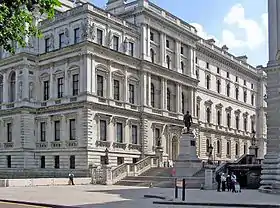
The Foreign, Commonwealth and Development Office occupies a building which originally provided premises for four separate government departments: the Foreign Office, the India Office, the Colonial Office, and the Home Office. Construction on the building began in 1861 and finished in 1868, on the plot of land bounded by Whitehall, King Charles Street, Horse Guards Road and Downing Street. The building was designed by the architect George Gilbert Scott.[41] Its architecture is in the Italianate style; Scott had initially envisaged a Gothic design, but Lord Palmerston, then Prime Minister, insisted on a classical style.[41] The English sculptors Henry Hugh Armstead and John Birnie Philip produced a number of allegorical figures ("Art", "Law", "Commerce", etc.) for the exterior.
In 1925 the Foreign Office played host to the signing of the Locarno Treaties, aimed at reducing tension in Europe. The ceremony took place in a suite of rooms that had been designed for banqueting, which subsequently became known as the Locarno Suite.[42] During the Second World War, the Locarno Suite's fine furnishings were removed or covered up, and it became home to a Foreign Office code-breaking department.[42]
Due to increasing numbers of staff, the offices became increasingly cramped and much of the fine Victorian interior was covered over—especially after the Second World War. In the 1960s, demolition was proposed, as part of major redevelopment plan for the area drawn up by the architect Sir Leslie Martin.[41] A subsequent public outcry prevented these proposals from ever being implemented. Instead, the Foreign Office became a Grade I listed building in 1970.[41] In 1978, the Home Office moved to a new building, easing overcrowding.
With a new sense of the building's historical value, it underwent a 17-year, £100 million restoration process, completed in 1997.[41] The Locarno Suite, used as offices and storage since the Second World War, was fully restored for use in international conferences. The building is now open to the public each year over Open House Weekend.
In 2014 refurbishment to accommodate all Foreign and Commonwealth Office employees into one building was started by Mace.[43]
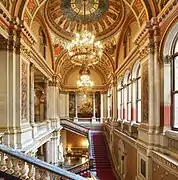 The Grand Staircase
The Grand Staircase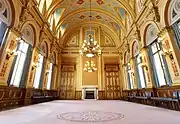 The Grand Locarno Room
The Grand Locarno Room The Durbar Court at the former India Office, now part of the FCDO
The Durbar Court at the former India Office, now part of the FCDO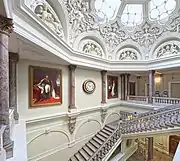 The Muse Staircase
The Muse Staircase
Devolution
International relations are handled centrally from Whitehall on behalf of the whole of the United Kingdom and its dependencies. However, the devolved administrations also maintain an overseas presence in the European Union, the USA and China alongside British diplomatic missions. These offices aim to promote their own economies and ensure that devolved interests are taken into account in British foreign policy. Ministers from devolved administrations can attend international negotiations when agreed with the British Government e.g. EU fisheries negotiations.[44] Similarly, ministers from the devolved administrations meet at approximately quarterly intervals through the Joint Ministerial Committee (Europe), chaired by the Foreign Secretary to "discuss matters bearing on devolved responsibilities that are under discussion within the European Union."
See also
- Conflict, Stability and Security Fund
- Department for International Development
- Foreign and Commonwealth Office migrated archives
- Palmerston (cat), resident Chief Mouser of the Foreign and Commonwealth Office
- Stabilisation Unit
- List of development aid agencies
References
- Foreign Office Settlement. London: HM Treasury. 2015. Retrieved 20 May 2016.
- "FCDO Board Non-executive Director". UK Government. Archived from the original on 20 July 2020.
- "About us". Foreign and Commonwealth Office. Archived from the original on 30 August 2020.
- Foreign & Commonwealth Office (June 2012). The Overseas Territories: Security, Success and Sustainability (PDF). ISBN 9780101837422.
- "Oral evidence: Future of the UK Overseas Territories". House of Commons. 5 December 2018.
- Global Britain and the British Overseas Territories: Resetting the relationship
- "Our ministers". GOV.UK. Foreign and Commonwealth Office. Retrieved 17 February 2020.
- "Her Majesty's Official Opposition". UK Parliament. Retrieved 17 October 2017.
- A brief history of the FCO Foreign and Commonwealth Office
- Weller, Toni (June 2010). "The Victorian information age: nineteenth century answers to today's information policy questions?". History & Policy. United Kingdom. Retrieved 9 December 2010.
- Berridge, G. R. "A Diplomatic Whistleblower in the Victorian Era" (PDF). grberridge.diplomacy.edu. Retrieved 5 June 2017.
- "Women and the Foreign Office". Issu.com. Foreign and Commonwealth Office. Retrieved 23 October 2018.
- "The Foreign and Commonwealth Ministries merge". The Glasgow Herald. 17 October 1968. p. 1. Retrieved 28 October 2017.
- Archives, The National. "The National Archives – Homepage". labs.nationalarchives.gov.uk.
- "Foreign Office management damned".
- Clary, David (16 September 2013). "A Scientist in the Foreign Office". Science & Diplomacy. 2 (3).
- "Apology over Pope 'condom' memo". BBC News. 25 April 2010.
- "Investigate UK funding of Palestinian NGOs". thejc.com.
- Gaspers, Jan (November 2012). "At the Helm of a New Commonwealth Diplomatic Network: In the United Kingdom's Interest?". Retrieved 26 November 2012.
- Laws, David (2016). Coalition: The Inside Story of the Conservative-Liberal Democrat Coalition Government. Biteback Publishing. ISBN 9781849549660.
- "Looking after our own: strengthening Britain's consular diplomacy". UK Government. 4 April 2012.
- "William Hague: Britain will have a global diplomatic network and the best diplomatic service in the world". ConservativeHome. 19 April 2012.
- "International development and Foreign Office to merge". BBC News. 16 June 2020. Retrieved 16 June 2020.
- "Joint ministerial team at Foreign Office and DfID reignites merger rumours". Civil Service World. 17 February 2020. Retrieved 16 June 2020.
- "Foreign Office and International Development merger will curb 'giant cashpoint' of UK aid, PM pledges". Sky News. 16 June 2020. Retrieved 16 June 2020.
- "Prime Minister announces merger of Department for International Development and Foreign Office". GOV.UK. Retrieved 19 June 2020.
- Stewart, Heather; Wintour, Patrick (16 June 2020). "Three ex-PMs attack plan to merge DfID with Foreign Office". The Guardian. ISSN 0261-3077. Retrieved 19 June 2020.
- "Opening of new Diplomatic Academy". Foreign and Commonwealth Office. 9 February 2015.
- "About us". UK Government. Conflict, Stability and Security Fund.
- "Cross-Government Prosperity Fund". UK Government. 22 December 2015.
- "Chevening".
Chevening Awards are supported by the Foreign and Commonwealth Office
- "Who we are". Marshal Scholarships.
Marshall Scholarships are mainly funded by the Foreign and Commonwealth Office
- "Forced marriage". UK Government. Foreign and Commonwealth Office; Home Office. 20 March 2013.
The Forced Marriage Unit (FMU) is a joint Foreign and Commonwealth Office and Home Office unit
- "Darwin Plus: environment funding for the UK Overseas Territories". UK Government. Foreign and Commonwealth Office; Department for Environment, Food and Rural Affairs. 22 May 2014.
UK Government policy advisers from... Foreign and Commonwealth Office
- "UK Science and Innovation Network". UK Government.
Part of: Foreign & Commonwealth Office
- "Foreign and Commonwealth Affairs". Hansard. March 2006.
- "The FCO Services Trading Fund Order 2008". UK Legislation. National Archives. Retrieved 1 May 2012.
- "Who we are". FCO Services. 24 May 2011. Archived from the original on 22 February 2013. Retrieved 18 June 2011.CS1 maint: bot: original URL status unknown (link)
- Say, Mark (21 July 2011). "FCO Services pushes secure cloud platform". Guardian Government Computing. Retrieved 1 May 2012.
- https://www.fcoservices.gov.uk/our-organisation/
- Foreign & Commonwealth Office History Archived 24 September 2012 at the Wayback Machine
- "Foreign & Commonwealth Office: Route" (PDF). FCO. Archived from the original (PDF) on 24 September 2012.
- "Mace wins £20m Whitehall Foreign Office refit". constructionenquirer.com.
- "Scottish gains at Euro fish talks". Scottish Government. 16 December 2009.
External links
| Wikisource has the text of the 1911 Encyclopædia Britannica article Foreign Office. |
 Media related to Foreign, Commonwealth and Development Office at Wikimedia Commons
Media related to Foreign, Commonwealth and Development Office at Wikimedia Commons- Official website
- Cockerell, Michael (1998). How to Be Foreign Secretary (Television production). BBC.
- Cockerell, Michael (2010). The Great Offices of State: Palace of Dreams (Television production). BBC.
